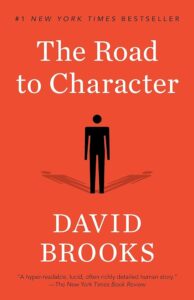 Summary: We need to be pursuing eulogy virtues, not resume virtues.
Summary: We need to be pursuing eulogy virtues, not resume virtues.
I like David Brooks. I don’t always agree with his politics, but he is largely a reasonable pundit, and even when I disagree, I understand his position. I liked his earlier book, Bobos in Paradise, but I have not gotten around to reading his last two books. But after a positive mention on Twitter by James KA Smith and Englewood Review of Books editor Chris Smith (and noticing that the audiobook was on Scribd but going away soon as part of some changes there), I picked it up.
This is a hard book for me to review. There is much to commend here. This is a better version of Eric Metaxes’ 7 Men. Brooks has a clear vision and has no problem telling us the secrets to the greatness of his profiled people. The secret is character.
But at the same time, this felt like a nostalgic look at character. For Brooks, character is about suffering. I do not completely disagree, but it is an overly simplistic understanding. Suffering is where we see character, suffering is like exercise that helps to develop character. But the development of character requires more than just suffering.
This is a surprisingly religious book. Brooks is Jewish and is known for being observant. But Brooks also went to Episcopal school and is familiar with Christianity (and several people have hinted that he may be Christian himself, although Brooks has not clearly said that he is.) Brooks calls for a return to the language of Sin and Grace throughout. These are theological words, and they are important to Brooks’ understanding of character, although it is not always clear how they are important because Brooks is resistant to making character a Judeo-Christian value.
In Brooks’ choice of figures to profile, he is not solely focusing on religious people, although they are heavily represented. The most interesting to me was his first profile, labor activist Frances Perkins, and the combined profiles of Civil rights pioneers A. Philip Randolph and Bayard Rustin. I had a vague background but could not have really identified any of them.
The rest of the list included more traditional figures: Eisenhower (both Ike and his mother), St Augustine, Dorothy Day, Samuel Johnson, George Elliot (the pen name of Mary Ann Evans), and George Marshall.
Part of what disturbed me about the book is that these profiles seem to confirm that the character is really a “great man” history. Brooks carefully points out not only the strengths but also the weaknesses of profiles. No one has a perfect character. However, I was not convinced that his examples were part of a broader cultural background instead of extraordinary individuals.
The final area of weakness is a lack of connection to modern life. Brooks attempted this in his summary chapter but did not go far enough. Throughout the book, he cites examples of suffering in a way that is primarily historical. Suffering for suffering’s sake is rejected (sometimes suffering is just suffering; it is not always redemptive). But if character is developed through suffering and struggle, there is no clear picture of how we develop character today, especially without a clearer religious understanding.
NT Wright and James KA Smith write about character development as primarily an issue of habit and liturgy, not suffering and struggle. Both of those authors are clearer about the endpoint (Christian formation and Christ-likeness) than Brooks, who seems to be more utilitarian in his understanding of the character.
The Road to Character is worth reading for Brooks’ aspirational ideas. But it also needs to be paired with something with a more traditional Christian focus on character.
The Road to Character by David Brooks Purchase Links: Hardcover, Kindle Edition, Audible.com Audiobook